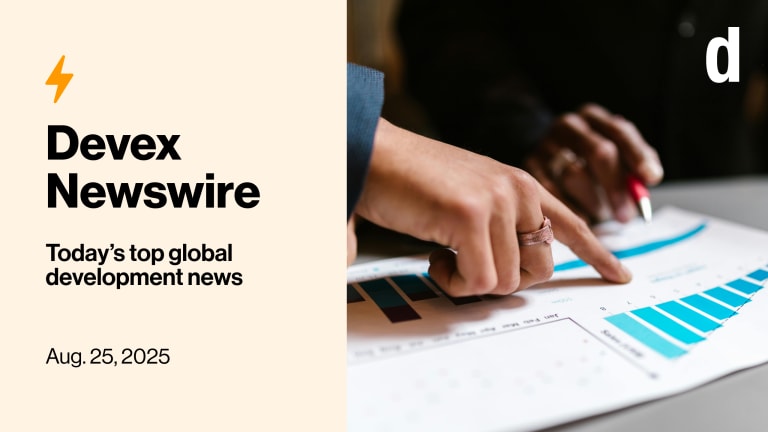
This is a preview of Newswire
Sign up to this newsletter for an inside look at the biggest stories in global development, in your inbox daily.
The Generation Equality Forum kicks off in Paris today. More than a quarter century after the landmark Beijing Declaration and Platform for Action, commitments on gender equality are still a work in progress, and the COVID-19 pandemic isn’t helping.
+ Join Us: The new frontier of fundraising is cryptocurrency. Today at 11 a.m. ET (5 p.m. CET), Senior Reporter Catherine Cheney and experts in crypto will chat about how fundraisers can adapt to this brave new world. Reserve your spot.
Hillary Clinton — who famously declared at the Beijing summit in 1995 that “women’s rights are human rights” — will speak at today’s Generation Equality Forum opening ceremony. So will Vice President Kamala Harris, who in March became the first U.S. vice president to address the Commission on the Status of Women.
My colleague Stephanie Beasley, who covers global philanthropy, will be watching the forum closely. She tells me to expect “major financial commitments toward ending gender-based violence and lifting barriers to paid work for women” from big philanthropic donors, including the Bill & Melinda Gates Foundation and the Ford Foundation.
Beyond borders
A new report from the International Federation of the Red Cross finds an “invisible wall” preventing refugees and migrants from getting COVID-19 vaccinations in many countries, Teresa Welsh reports.
• While many countries have included refugees and migrants in their national vaccination plans, 90% of those surveyed said a lack of information or awareness is preventing those populations from actually getting shots.
• 67% said language barriers are an obstacle.
• Documentation is also a big concern, particularly with undocumented migrants, who are worried about providing information to health authorities. The mishandling of Rohingya refugees’ biometric data offers a recent worst case example.
Read: 'Invisible wall' bars refugees, migrants from COVID-19 vaccine access
ICYMI: When will Rohingya refugees be vaccinated?
June’s top Pro reads
Too hot to go outside? Catch up on our Pro coverage. This month we looked into nonprofits that are reimagining the workweek, and who received COVID-19 funding from USAID. Wondering about our Pro subscription? Here is what our readers enjoyed this month:
• Global nonprofits among grantees in MacKenzie Scott's $2.7B donation
• Top USAID contractors in 2020: Who received COVID-19 funding?
• The NGO working a 28-hour week
+ Devex Pro is our paid news subscription offering deeper analysis of the development sector, exclusive access to digital events, and the opportunity to engage directly with our newsroom. Explore Pro with a 15-day trial.
Fluid situation
The Ethiopian government’s unilateral cease-fire declaration on Monday is still surrounded by questions. Namely: Will all parties adhere to it, and will the new power dynamic produce unfettered humanitarian access to a region on the brink of famine?
Adva Saldinger reports from a U.S. House Foreign Affairs Committee hearing on Tuesday, where the committee chairman, Rep. Gregory Meeks, vowed not to “be asleep on what has taken place.”
Adva writes: “The U.S. has already placed visa restrictions and some sanctions on parties involved in the conflict and is withholding support to Ethiopia provided through multilateral development banks. But the State Department has yet to make a determination about whether the atrocities in the Tigray region amount to ethnic cleansing, crimes against humanity, or genocide — which are violations of international law that would compel the U.S. to act.”
Trickle down
Calls to “decolonize” the aid system often focus on shifting power and resources to communities affected by development programs. But change also needs to happen at the top.
A recent analysis by the Center for Global Development found that “only 2% of governing board members across 10 of the largest international humanitarian aid organizations had personally experienced a humanitarian crisis or spent time as refugees.”
“To truly shift the power and reform, the aid sector must grapple with the governance of its own systems, including control over its resources and steering of its missions,” write Patrick Saez and Rose Worden.
Opinion: NGO boards don't represent who they serve. That must change
Blame game
While most Britons are busy cheering for England’s national football team, a handful of anti-lockdown diehards spent their weekend chanting “arrest Bill Gates” outside his foundation’s London headquarters.
“Nobody would have predicted that I and Dr. Fauci would be so prominent in these really evil theories,” Gates told Reuters earlier this year. “I’m very surprised by that. I hope it goes away.”
Responsibility to paw-tect
Cats, meanwhile, have been deployed to locate the humanitarian-development nexus.
In other news
The U.K. will offer vaccination to delegates of the U.N. climate change conference to be held in Glasgow in October. [Reuters]
Sea level rise due to climate change could mean more than 400 million people are living in areas less than 6 feet (2 meters) above sea level by 2100, one study finds. [The Guardian]
Members of the U.N. General Assembly on Tuesday agreed on the $6 billion budget needed to avoid the shutdown of peacekeeping missions around the world. [Reuters]
Update, June 30, 2021: This article has been updated to clarify that it is the U.N. General Assembly that agreed on a $6 billion budget to avoid shutdown of peacekeeping missions.
Sign up to Newswire for an inside look at the biggest stories in global development.








